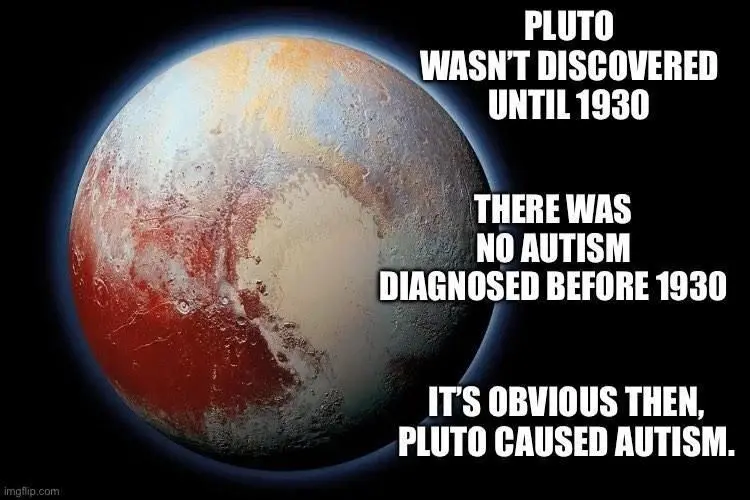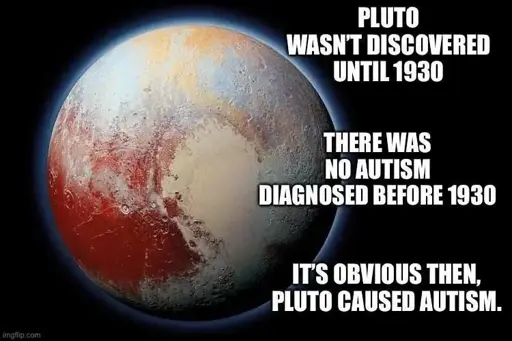Anti-vaxxers in a nutshell
-
This post did not contain any content.

-
 M [email protected] shared this topic
M [email protected] shared this topic
-
[email protected]replied to QuentinCallaghan last edited by
Correct, just like nic cage movies cause kids to drown
-
[email protected]replied to QuentinCallaghan last edited by
I'm withholding opinion until I hear from Jenny McCarthy on this.
-
[email protected]replied to QuentinCallaghan last edited by
You at it again Andrew Wakefield?
-
[email protected]replied to QuentinCallaghan last edited by
And in 2006, Pluto was declared not a planet. Also in 2006, Facebook went public. Coincidence? I think not!
-
[email protected]replied to QuentinCallaghan last edited by
So, you're saying for thousands of years nobody knows about Pluto. Then a handful of people suddenly start obsessively monitoring the night sky and enumerating every object they can see in a big journal. More and more of them start building bigger and bigger telescopes, blowing enormous sums of money on this seemingly pointless hobby. They're spending the most productive years of their lives sleeping through day so they can wake up in the middle of the night and count celestial objects. And then you're telling me Pluto caused Autism?
I think you've placed the cart before the horse.
-
[email protected]replied to QuentinCallaghan last edited by
As an autist, I agree. I wouldn't be like this if it wasn't for that damn
planetspace rock! -
Nice example for:
https://en.wikipedia.org/wiki/Correlation_does_not_imply_causation -
[email protected]replied to [email protected] last edited by
So you’re saying autism caused Pluto?

-
You don't really trust this leftist liberal biased wikipedia, do you?
(/s to be sure)
-
I'm just gonna hold my pinion til I see her.
-
They should rename Pluto to Augmentin since Pluto is associated with a planet in older literature.
-
ERROR: Earth.exe has crashedreplied to QuentinCallaghan last edited by
They (the anti-vaxxers) didn't know about autism before they were born, therefore, antivax causes autism?
-
[email protected]replied to [email protected] last edited by
It's the only conclusion that makes sense.
-
[email protected]replied to [email protected] last edited by
plutocracy confirmed
-
[email protected]replied to [email protected] last edited by
I don't know, I read a post on the internet that says the opposite
-
Or did those with autism cause Pluto? Correlation does not prove causation. They weren't able to fully connect the dots in the case of vaccines. They only saw a mere common "trend" among the research and ran with it.
-
[email protected]replied to QuentinCallaghan last edited by
Can we please get an autistic info dump on pluto in this thread
-
[email protected]replied to [email protected] last edited by
your gamble paid off
I feel joy for you
-
[email protected]replied to [email protected] last edited by
Pluto is a dwarf planet located in the Kuiper Belt, a region of the solar system beyond the orbit of Neptune. It was discovered in 1930 by Clyde Tombaugh and was originally classified as the ninth planet in our solar system. However, in 2006, the International Astronomical Union (IAU) redefined the definition of a planet, and Pluto did not meet all of the criteria. As a result, Pluto was reclassified as a dwarf planet.
Pluto has a diameter of about 1,473 miles (2,370 kilometers), making it smaller than the United States. It has a highly eccentric orbit, which means that its distance from the sun varies greatly over the course of its 248-year-long orbit. At its closest approach to the sun, Pluto is about 2.7 billion miles (4.3 billion kilometers) away, while at its farthest point, it is about 4.6 billion miles (7.4 billion kilometers) away.
Pluto has five known moons: Charon, Styx, Nix, Kerberos, and Hydra. Charon is the largest of these moons, with a diameter of about 750 miles (1,200 kilometers). It is so large that Pluto and Charon are often referred to as a binary system, with Pluto and Charon orbiting a common center of mass.
Pluto's surface is composed of a mixture of water ice, methane ice, and nitrogen ice. It has a very thin atmosphere, which is composed mainly of nitrogen, with some methane and carbon monoxide. The atmosphere collapses when Pluto is far from the sun and reforms when it is closer.
Pluto's temperature varies greatly depending on its distance from the sun. When it is at its closest approach to the sun, the temperature on Pluto can reach as high as -387 degrees Fahrenheit (-233 degrees Celsius). When it is at its farthest point from the sun, the temperature can drop as low as -396 degrees Fahrenheit (-238 degrees Celsius).
Despite being a dwarf planet, Pluto is still a fascinating and mysterious object in our solar system. Scientists are still learning new things about Pluto, and there is much more to be discovered about this icy world and its moons.

